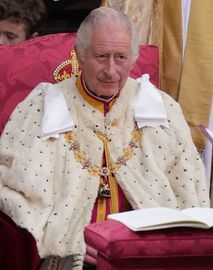Now that the coronation tamasha is behind us, let us examine the mockery of monarchy in today’s aggressive social media times, and say it like it is. For starters, even the comparatively subdued and scaled down ceremony at Westminster Abbey on May 6 looked joyless and shopworn. “Uneasy lies the head,” etc, summed up global sentiments, as several big-ticket guests politely declined to show up for an antiquated, out-of-sync Brit ritual that bordered on the absurd, given the tattered state of the empire. A severely dysfunctional royal family representing the House of Windsor, paraded its multiple neuroses on camera, making it harder still for loyalist royalists to express their adoration of the newly anointed king, who insists on his shoe laces being ironed every morning by a servile valet.
Being batty is a peculiar Brit privilege, especially when it comes to royalty. The international outrage has little to do with King Charles’s personal peccadilloes; it is more about propriety and restraint in a changed world order, especially at a time when Britain is reeling under formidable economic woes. It is a question of timing. And public sentiment. Queen Elizabeth was a deeply loved, greatly revered titular head of the commonwealth. Just her presence and engagement with the public generated revenue for the country, making her a top tourist attraction and a powerful symbol of all that one associates with royalty. Her son has no such cache. She was loved. He is loathed. Subjects did not mind subsidising the queen and her large family during her lifetime. That narrative has dramatically changed. Had King Charles and his courtiers been a little more sensitive, he would have had himself anointed king in the privacy of the palace, surrounded by his immediate family. Additionally, had he chosen not to conduct such an elaborate coronation ceremony, a great deal of embarrassment would have been avoided. As so many desis lamented, “No matter what the differences are within a parivaar, it is important to present a united front to the public. How could a father single out his own son (Prince Harry) and subject him to universal humiliation?”
Fortunately, for Charles, not everyone was as critical or cynical. Surprisingly, Mark Tully gushed over the occasion in his column titled—The king’s coronation is a testament to the crown moving with the times. Surprised? Tully went on to exclaim, “Charles just had to say, ‘I come here to serve rather than to be served’.” He expressed sympathy for the king who had to see the pain and suffering of his aunt, Princess Margaret, because she was not allowed to marry a divorced man. Gosh! That must hurt! Tully mentions the genius of the British crown. And there are references to the “Hindu” Prime Minister Rishi Sunak, who read the first section of the New Testament. Tully is not the lone fan. My own daughter, Anandita, rushed to London to be there in time to watch the coronation with other enthusiasts. She is an unapologetic royalist, and even though the rest of us bombarded her with criticism, she kept sending videos of exultant crowds lining the route, cheering the new King.
My own brief encounters with King Charles and Queen Camilla years ago were highly entertaining. Both of them were exceedingly pleasant as they chatted amiably with the natives. I wish heiress Akshata Sunak had worn a beautiful sari on coronation, instead of a nondescript blue Cinderella tea dress by Claire Mischevani. A sari would have taken away nothing from the optics. On the contrary, it would have stolen the show!
Charles has been to India ten times. Let’s wait for the 11th royal visit of Britain’s new raja.
@DeShobhaa @shobhaade


